Immortal Lee County Killers Ii - Interview
by Anthony Dhanendran
published: 12 / 3 / 2003
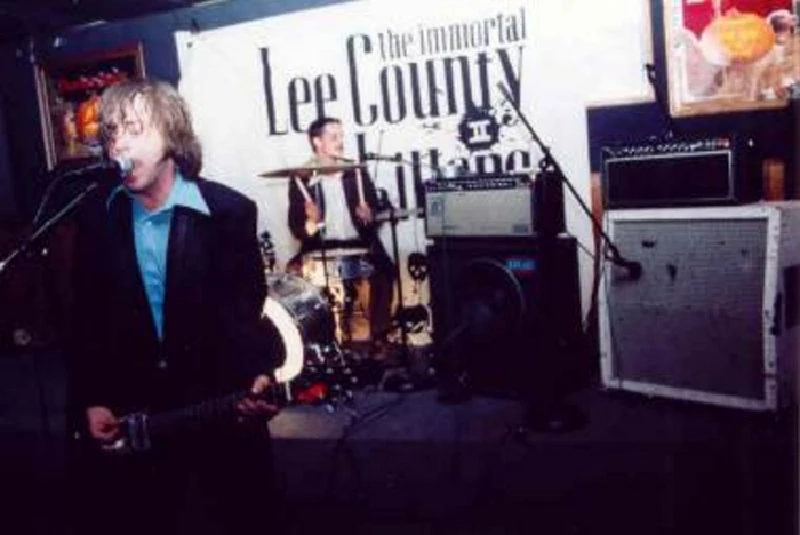
intro
Alabama punk blues duo the Immortal County Lee Killers have just released their second album 'Love is a Charm of Powerful Trouble'. Anthony Dhanendran meets with them at the end of the British leg of their first European tour to talk about it
The Immortal Lee County Killers (II, this being their second incarnation) play punk blues, or alt.garage, or fucked-up rock, or any other inadequate description. Chet “the Cheetah” Weise and JRR “the Token One” Tokien (possibly not his real name) are taking the blues apart bit by bit, setting fire to the pieces, and then reassembling the whole thing. Coming from Lee County, Alabama (and, obviously, being immortal) the final part of the band’s name is a tribute to the original rock’n’roll killer, Jerry Lee Lewis. The Southern-state thing sets them apart from contemporaries such as the White Stripes who, in comparison, sound like sedentary imitators. Pennyblackmusic spoke to them at the end of their recent European tour. PB : Your latest album ['Love is a Charm of Powerful Trouble (Estrus Records', ES1285D)] seems to vary a lot – when you get through to the last few tracks it seems a lot more controlled than it was to begin with. CW: That was intended, premeditated. The Killers’ first record ['The Essential Fucked up Blues' (Estrus Records, ES1277)] was all about the electric guitar, turning’ it up, punk rock and Muddy Waters. There’s parts of it, still, that sound more like Blue Cheer than anything. So we wanted to leave room on this second record to do some different stuff. As a duo one of the challenges is for our records to vary from one release to the other. And that was the direction I wanted to go. JR and I’s other band, the Quadrajets, was always known for being loud, well louder, faster, faster. But both of us listen to Hank Williams Sr., and jazz, and all kinds of music. And obviously the blues. So on this record we decided to kinda hit everybody with a left hook and do songs like 'Truth Through Sound', and 'What Are They Doing In Heaven Today ?', and also as far as the dynamic goes, and our reputation and that record goes, it’s varied. Just like a good story, a good novel, there’s a link between everything. And that’s another thing that this album set out to do is, what we’re doing – it can be played on acoustic guitar, it can be played on electric guitar, it was exposing our roots even more. You’ve got a Willie Dixon song on there. If JR and I played that same Willie Dixon song through a fuzz pedal and with drums, and increased the volume, but kept it the same tempo and with the exact same notes, it would be a completely different animal. It would have a completely different effect. So that was kind of, uh, we were trying to demonstrate something. And, uh, the dynamic in music is just really important. It makes the next song, if it’s cranked up, feel even more cranked up, and when you get to an acoustic song, or 'That’s How Strong My Love Is', or something, it kind of gives the heart a chance to relax. We’re trying to communicate at all sorts of different levels. And also, JR didn’t play drums on the first one and his style of play really allowed that door to be opened, ‘cos there are some of the acoustic tracks where JR is just hitting a bass drum or thrashing a snare head. JR thinks about percussion a lot of the time in ways that a lot of drummers don’t, so that really opens up some doors. PB : How much does your live performance depend on your mood? JR: Well, live shows are generally more raw than records. It’s a funny thing, ‘cos records you listen to and shows you watch more. So they're two different beasts, two different kettles of fish, or whatever, and you have fun with both of them. If you’re in the studio you can get kind of fancy with different auxiliary percussion things, maracas or claves or whatnot, and you can do some more acoustic guitar stuff. And live, you just go with what you got. With me it’s all sporadic, it’s all spur of the moment. Not much is premeditated – it’s better to go with your gut instinct. CW: Unfortunately it’s very difficult for us to do the more acoustic songs in a setting like tonight. With three bands, you have 45 minutes to play. It’s kind of like JR said. We’ve got to work with what we have, and to do those acoustic songs on stage, and to do ‘em good we’d have to change our whole setup and I don’t want to do that. But when you see the show tonight, we do play a lot of songs that are the slower blues tunes. We turn down. I take the volume on my guitar and I turn it right down, and he plays softer and we do our best, and we do try to – when we play live you do still see the extremes between the volume, soft and loud, and energy and restraint, but it’s not as pronounced as on the record. ‘Cos like JR said, the record is a different thing. Now we recorded our record all live. We tried to keep the live vibe in there. We just set up all the amps in the practice room and just let it rip. But there’s no audience and we have more than 45 minutes to play, and that allows some different choices, different options. PB : Do you find that you’re more controlled in the studio? JR: Not necessarily. CW: I think the best way to answer that question is to not directly answer it. It’s easier for us to really lose ourselves in a live show, with the audience. ‘Cos when the audience is into it, everybody’s into the music, then everybody kind of goes to a different place, mentally and physically. The audience is jumping around and dancing’ and having a good time. We end up jumping around, dancing. We kind of feed off one another. When we record, that element’s not there. But, there’s other emotions, and catalysts and tensions, when recording, that will get us to do something a little bit different, like playing’ a song four times in a row. You know, by the fourth take it’s either, “Fuck this, I don’t wanna play this anymore,” and we lose it. It loses energy, or it’s, “Fuck, this is gonna be the best time we’ve ever played this,” and it comes out. Or being excited about actually documenting the music and recording it, that can really add a lot of energy. It’s different environments, and I don’t think anybody will ever be able to – I just think it’s impossible to put on record a true live show. You get closer and closer, but either with live shows you have microphones strapped to your face everywhere, recording engineers, and soundcheck lasts forever. There’s the pressures of, “If I fuck this up, it’s gonna be on record for ever [laughs]…” PB : How are you finding your first European tour? CW: Great, it’s great. Tell ‘em about it, JR. JR: It’s the most fantastic time I’ve ever had. The UK, Spain, France, Portugal, Germany, Sweden, France, Norway, Austria, Slovenia, Switzerland, Belgium, Denmark. This has been the best time, the best five weeks I’ve ever had. It’s really truly been amazing, fuckin’ brilliant. CW: As musicians, what could possibly be better than travelling thousands of miles from your home and people actually appreciating your music, having a good time? You're sitting here, interviewing us, giving a shit about what two guys from Alabama actually think and feel. You know, it’s great. And this tour of Europe has frankly surprised both of us with how many people have been interested in what we’re doing. This is our first tour of Europe, and it’s all about letting’ people know that we’re around, and we were pleasantly surprised that actually quite a few people did know we were around [laughs]. The United States is a big place. We play Canada too. There are some cities where the show will be sold out an hour after tickets go on sale and there are some places where there’ll be 15 people there. I don’t think that will ever change for us, and there’s very few bands that can tour the US and have crowds everywhere they play. It’s just such a varied place, and so the drives are so long. It’s inevitable that you find yourself playing in some God-knows-where little town in some corner of somebody’s laundry-mat. We’ve played a bunch of laundry-mats [laughs]. We throw our laundry in the machine, go play our set, get out and we’ve got clean clothes, I’m not kidding. That’s happened in many places. PB : You play a wild take on the blues – what reaction have you had from purists? CW: Most people have been very supportive of what we’re doing. ‘Cos most people who are into music and into blues and rock’n’roll, they know enough that the way that punk rock, or blues, or anything, survives, is by staying fresh, changing and evolving, and nowhere is that more prevalent than in blues. It just so happens that in the last couple of decades there’s been a stereotype, that’s occurred, that’s happened, I think, with punk rock in the last few years. Those people, they don’t like us, but… JR: They can kiss my ass. CW: Those aren’t the people that we’re really playing for. Now I want everybody to give us a chance. And if somebody doesn’t like us because they just don’t like my voice, or they don’t like what we’re doing, I understand that, but everyone should at least give us a chance. Now we’re just starting to become known enough now that I think the blues establishment is starting to hear of us. There’s people in blues that are lovers of music. They just have a voracious appetite for music. But we’re starting to get to that level where we’re going to start hitting the purists who are going to be saying things about us. When someone tells me that we can’t play blues because we’re white, or we’re too young, or we’re not from 1908, I just can’t take that seriously. PB : Have you heard that sort of comment about you? CW: We’ve had a few, you know – reviews and bits here and there. Not very many. JR: ‘Cos if you like the Killers, that’s fine. If you don’t like the Killers, that’s fine. If you even hate the Killers, that’s fine too, because the Killers, Chet and I, we do it for the people that do like it. We don’t do it for the people that cry and whine and complain [he breaks off to imitate a whining non-fan]. I mean, come on. PB : What about your influences. You’ve mentioned Black Sabbath before. CW: Well, Sabbath took a lot from blues, especially the first album. But do I think of myself as a blues musician, I guess first and foremost we think of ourselves as musicians, and I think we play our own kind of blues. Almost every artist says this, but I don’t want to have this mindset that I am a Blues Player, or a Punk Player, because that’s gonna start fucking me up. JR: Too many limitations. CW: I think that we have definitely evolved blues one step, because of taking pieces from different kinds of music and putting’ them together. I guess five, ten years from now, when all the dust has settled, maybe that’s when ourselves and other people actually decide what the fuck we were doing… PB : Where do you see yourself in those five, ten years? CW: I never. Five, ten years ago, I never thought I’d be here. So if there’s anything that I’ve learned it’s maybe, set some goals and plan for the future, but don’t predict it. About the best we can do right now is figure out where we’re gonna be six months from now. There’s gonna come a time and a place for change, but I don’t know when it’s gonna come, and as far as musicians go anywhere on the earth, a musician can only play outside his room if somebody wants to hear his music. So I could be very happy just sitting in my room again, just like I did a few years ago playing to myself. If that’s what happens. I mean, I like it better sharing it with people, but all it takes is for a new wave of disco or something, and we’ll be back in our living rooms. Or a change of heart somehow. Coltrane completely changed his outlook on music and what he was doing, in his 30's. He just changed instruments and went on a completely different tangent. PB : Is Coltrane a hero of yours? CW: Yeah, especially recently. I’ve always listened to him and I’ve always loved his music, but recently he’s one of the few people that I’ve delved into their personal lives. Usually with musicians I leave the personal life alone. They gave me their music. That’s usually where I keep it. But I started reading about him. He’s a real good inspiration. PB : So how do you feel about your personal life being splashed everywhere? CW: We’re still a little ways from being splashed everywhere! I don’t say anything that I don’t want people to hear, as long as I’m giving my two cents worth. The only thing that bothers me is that a lot of the time people might misunderstand what I’m saying, get the wrong idea about a lyric or something I said, that I don’t have a chance to correct, but that’s just part of touring. No, I’ve been freaked out a few times in interviews, like when people in Germany ask me about my specific neighbourhood that I grew up in. It doesn’t scare me, but God damn, how did they find that out? PB : Is there anyone around that you’re keen to work with? CW: We could sit here for an hour and talk about that! But we are going to do some stuff with Tim Kerr, who was in the Big Boys, and Poison 13. We’re gonna do some stuff with Ken Vandermark, who the New York Times says is the most important young jazz player around today. So those are some people that we’re definitely gonna work with. But there’s tons of musicians that I’d love to play with. PB : What are you guys up to in the next few months? CW: We’re gonna be at home, have a couple of days off, and we’re gonna record an EP. Gonna record about 5 or 6 songs. We’re gonna do a tour of the US with the new record, and I was actually talking to a booking agent last night about maybe trying to come back here in late August. So we’re gonna come back. Everything’s been successful and I think it warrants a return trip. Frankly I think there’s enough people interested in what we’re doing right now that I won’t end up back in my living room anytime within the next year… PB : Thank you
Picture Gallery:-
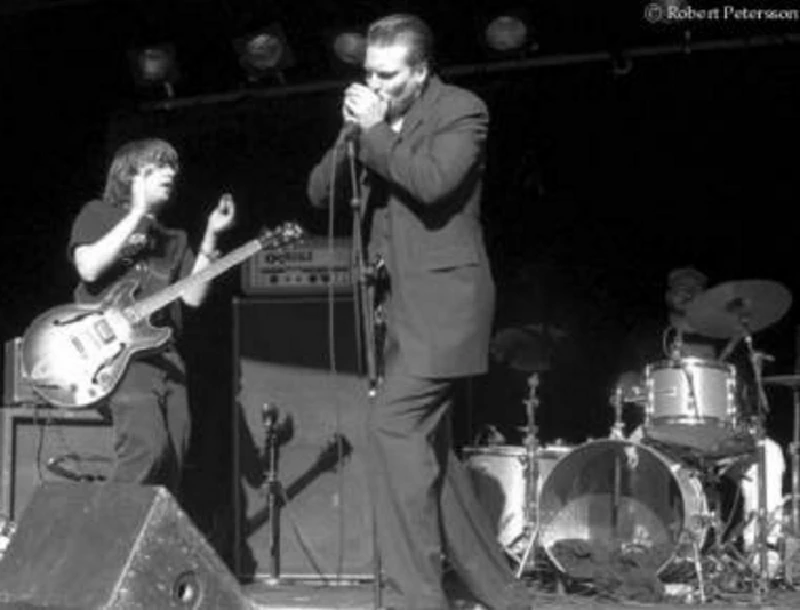
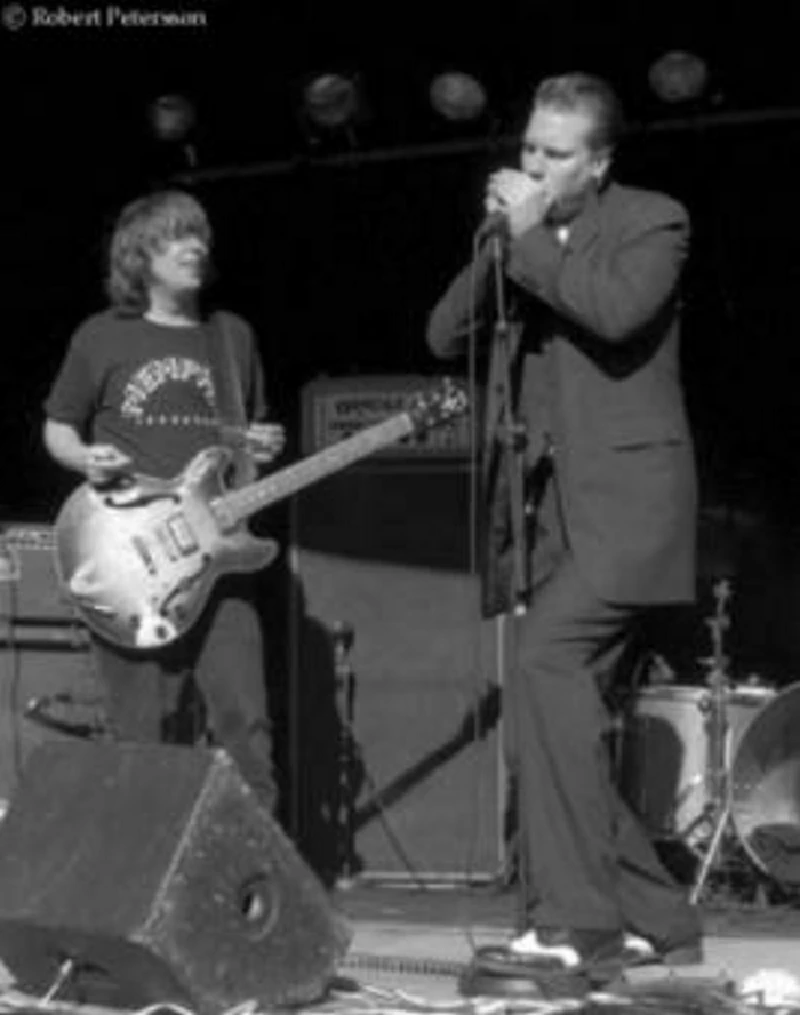
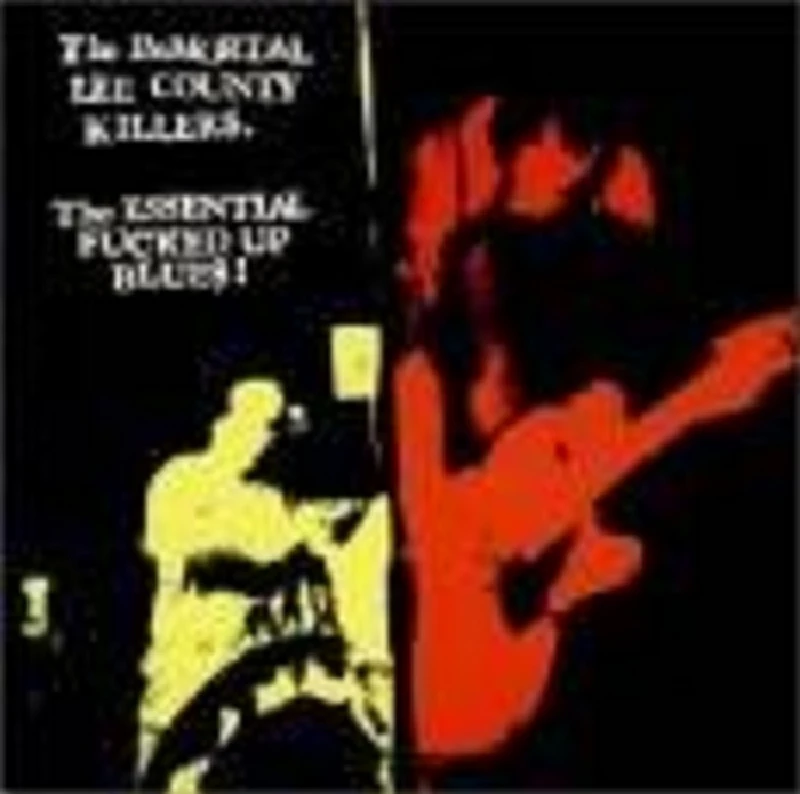
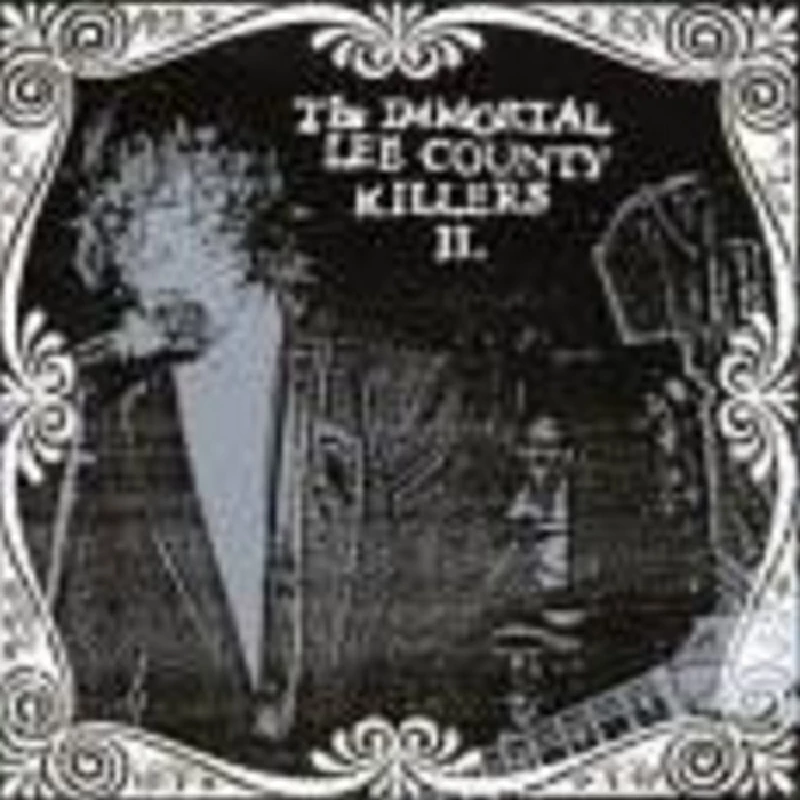
live reviews |
|
100 Club, London, 15/1/2004 |
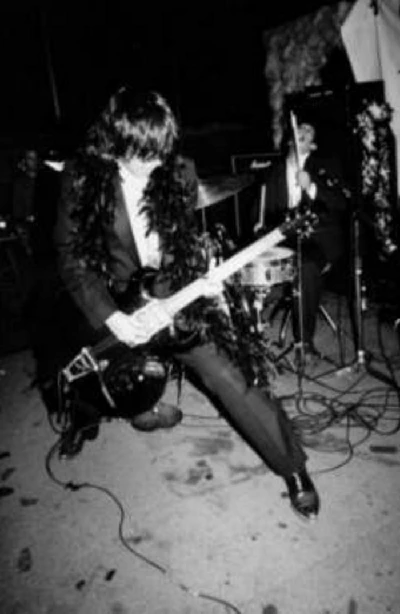
|
| Immortal Lee County Killers 2 look like they could be on the run from a Deep South penitentiary. New writer Daniel Cressey watches them "create some of the most viscerally exciting and downright loud blues available" at London's 100 Club |
most viewed articles
current edition
Shrag - Huw Stephens Session 08.12.10 and Marc Riley Session 21.03.12Gary Numan - Berserker
Razorlight - Photoscapes
John Hassall - Photoscapes
Max Bianco and the BlueHearts - Troubadour, London, 29/3/2025
Primal Scream - Photoscapes
Roberta Flack - 1937 - 2025
Waeve - Club Academy, Manchester, 18/3/2025
previous editions
Heavenly - P.U.N.K. Girl EPManic Street Preachers - (Gig of a Lifetime) Millennium Stadium, Cardiff, December 1999
Boomtown Rats - Ten Songs That Made Me Love....
Beautiful South - Ten Songs That Made Me Love...
Barrie Barlow - Interview
Oasis - Oasis, Earl's Court, London, 1995
Trudie Myerscough-Harris - Interview
Dwina Gibb - Interview
Pixies - Ten Songs That Made Me Love...
Doris Brendel - Interview
most viewed reviews
Pennyblackmusic Regular Contributors
Adrian Janes
Amanda J. Window
Andrew Twambley
Anthony Dhanendran
Benjamin Howarth
Cila Warncke
Daniel Cressey
Darren Aston
Dastardly
Dave Goodwin
Denzil Watson
Dominic B. Simpson
Eoghan Lyng
Fiona Hutchings
Harry Sherriff
Helen Tipping
Jamie Rowland
John Clarkson
Julie Cruickshank
Kimberly Bright
Lisa Torem
Maarten Schiethart